In Praise Of Amateurs IELTS Reading Answers
8 min read
Updated On
-
Copy link
Table of Contents

Limited-Time Offer : Access a FREE 10-Day IELTS Study Plan!
The Reading Module of the IELTS can be the top-scoring category, with diligent practice. To achieve the best results in this section, you must understand how to approach and answer the different Question types in the Reading Module. By solving and reviewing Sample Reading Questions from past IELTS papers, you can ensure that your Reading skills are up to the mark.
The Academic passage ‘In Praise Of Amateurs ‘ is a reading passage that appeared in an IELTS Test.
It contains some of the IELTS reading question types. If you are interested in familiarising yourself with all the question types, don’t hesitate to take an IELTS reading practice test.
The question types found in this passage are:
Summary Completion
In the summary completion question, you will be provided with an incomplete summary. This question task type comes in either of the two options: one where you choose words straight from the text and the other where you select words from a list of options. If f you have to choose words from the text, the instructions will specify how many words or figures you should include in your response. However, if you are required to select terms from a list, they can be synonyms (words with similar meanings) or antonyms (words with opposing meanings) of the text’s words, or they can be taken directly from the text.
Matching Features
In the Matching features type of question, there will be a list of items in the box and some features related to it. You need to match these items by reading and understanding some sentences in the passages. The list may be of the name of people or cities. For example, If there is a name of a person in the box of items then the question may be to match the sentence with the person who said them. Like other types of match questions, some of the items mentioned may not be available in the passage. So, to save time read the passage before answering each question.
In Praise Of Amateurs
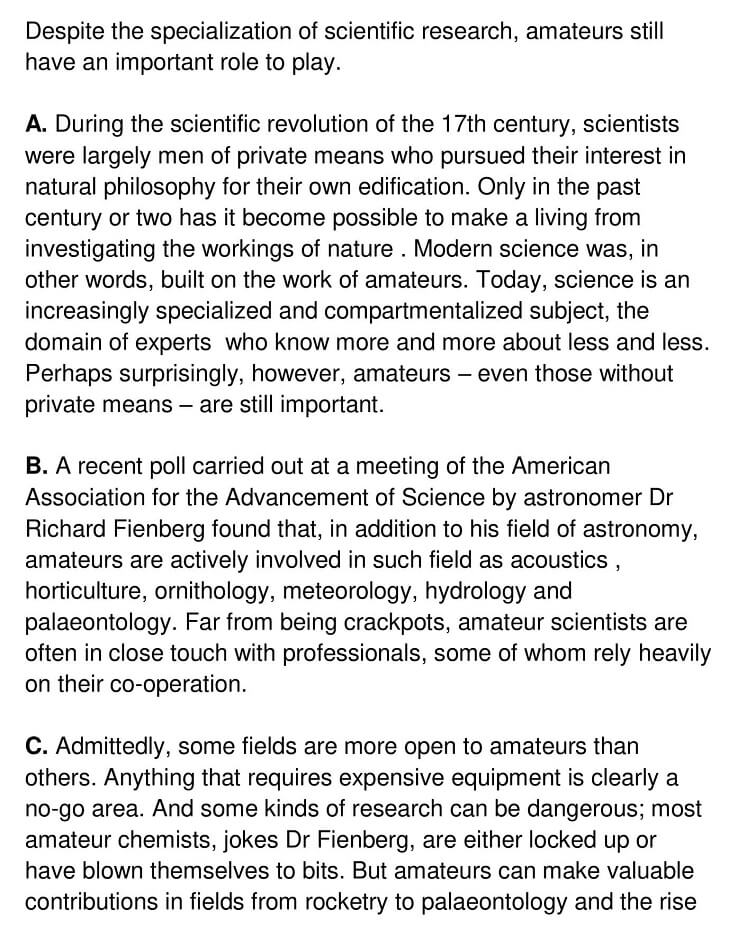
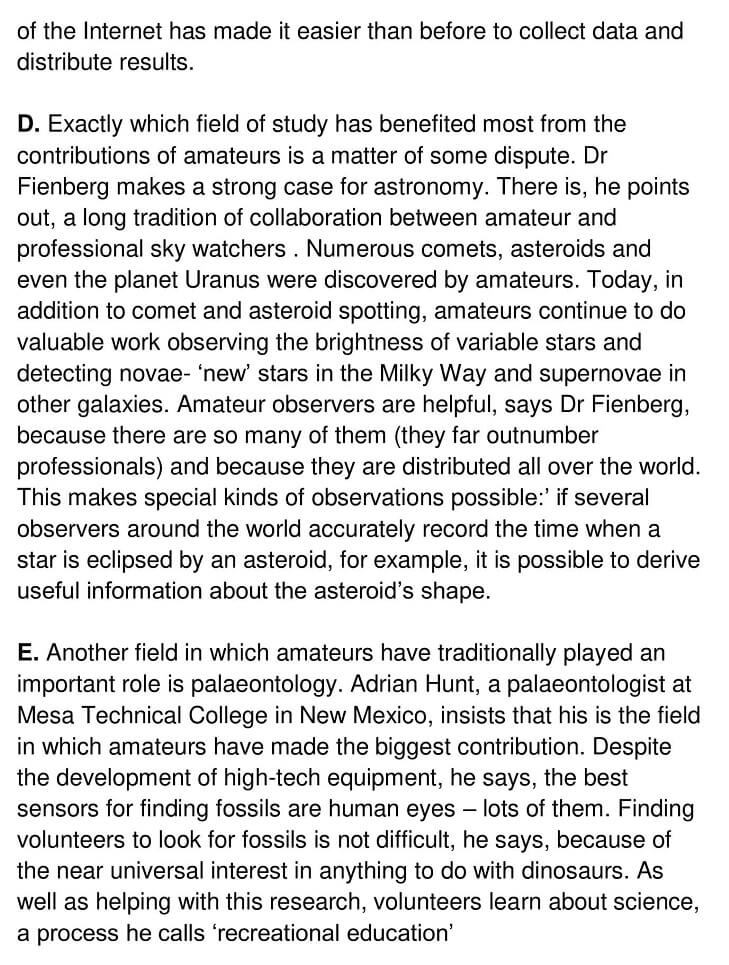
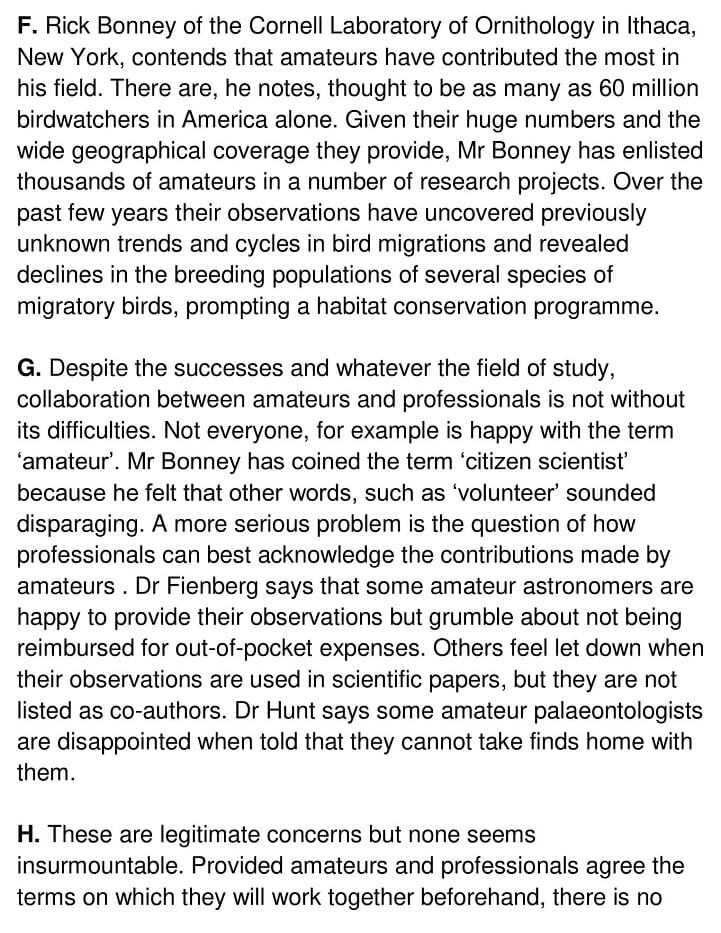
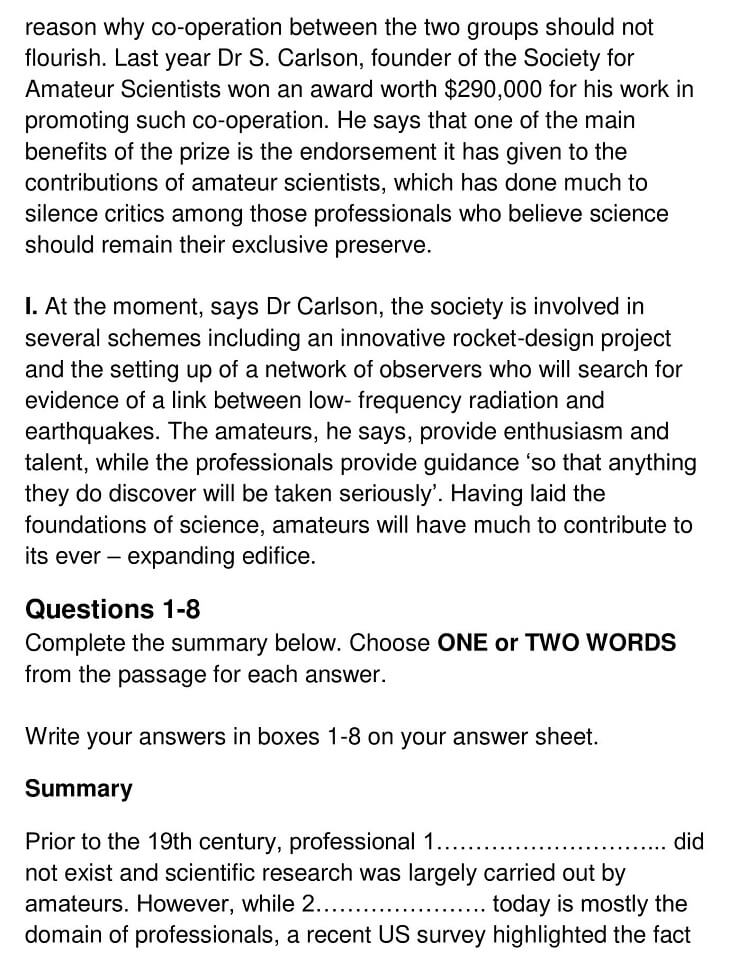
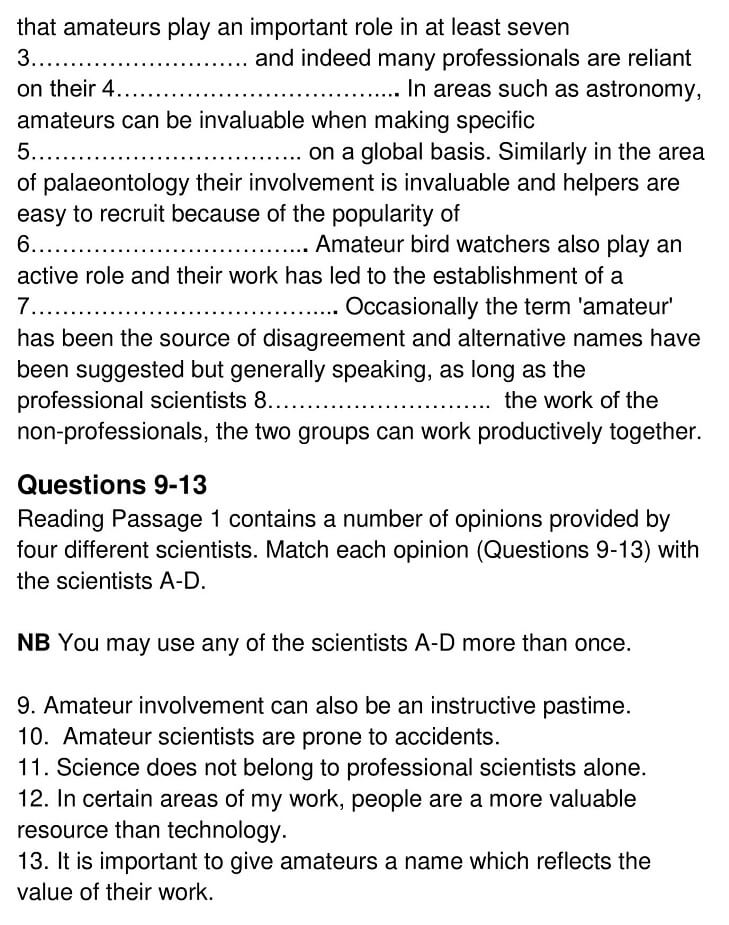
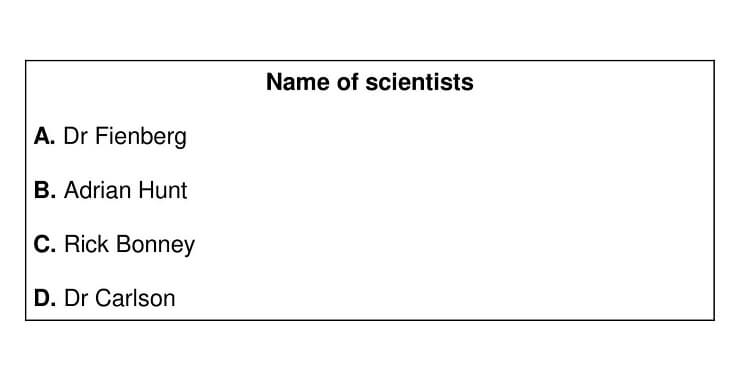
Answers
Unlock Answers
1 Answer: Scientists
Question Type: Summary Completion
Answer location: Paragraph A, line 1
Answer explanation: At the beginning of paragraph A, it is mentioned that during the scientific revolution of the 17th century, which is prior to the 19th century, scientists pursued their research in natural philosophy for their own intellectual improvement (‘edification’) and worked on their own resources (‘of private means’). They did not ‘make a living from investigating the workings of nature’ and therefore, were not professionals who engaged their skills to participate in a paid profession. As a result, modern science is based on the unpaid efforts of amateurs which are later developed by scientists. Hence, the correct answer is ‘scientists’.
2 Answer: Science
Question Type: Summary Completion
Answer location: Paragraph A, line 4
Answer explanation: In the fourth sentence of the first paragraph, it is said that today, science has been divided into sections (‘compartmentalized’) like paleontology, astronomy, ornithology, to name a few, and only skilled ‘experts’ have started working in specified spheres of their knowledge (‘specialized’). As a result, the scientific professionals have gained more specific knowledge in areas that were lesser-known till then (‘know more and more about less and less’) making ‘Science’ a more exclusive domain to the professional experts rather than the amateurs. Hence, the correct answer is Science.
3 Answer: field
Question Type: Summary Completion
Answer location: Paragraph B, line 1
Answer explanation: In paragraph B, the observation of astronomer Dr. Richard Fienberg has been mentioned which states that apart from astronomy, which is his ‘field’, there are six more ‘fields’ of science – acoustics , horticulture, ornithology, meteorology, hydrology and palaeontology- in which the amateurs are ‘actively involved’(play an important role). Hence, the correct answer is ‘field’.
4 Answer: cooperation/collaboration
Question Type: Summary Completion
Answer location: Paragraph B, last line
Answer explanation: At the end of the second paragraph, it is mentioned that while doing their research, the amateurs often communicate (‘in close touch’) with the professionals. So, the scientists become dependent or ‘reliant’ (‘rely heavily’) on ‘their’ (the amateurs) ‘cooperation’ and need to collaborate with them to gain more knowledge in their field of research. Hence, the correct answer is ‘Cooperation/collaboration’.
5 Answer: observation
Question Type: Summary Completion
Answer location: Paragraph D, line 3
Answer explanation: In paragraph D, Dr Fienberg points out that amateurs have discovered ‘numerous comets, asteroids and even the planet Uranus’. In addition to the discoveries, they continue to do valuable work ‘observing the brightness of variable stars and detecting novaes’. These observations have become more valuable because the amateurs are ‘distributed all over the world’ (global basis) which helps them in making ‘special kinds of observation’. Hence, the answer ‘observation’ is correct.
6 Answer: dinosaurs
Question Type: Summary Completion
Answer location: Paragraph E, line 4
Answer explanation: Paragraph E talks about the importance of amateurs in paleontology- the branch of science concerned with fossil animals and plants. Adrian Hunt says that ‘finding volunteers for fossils is not difficult’ because people all over the world (‘universal’) have an interest in dinosaurs which have become fossils. Dinosaurs are popular among people and the large creatures attract the attention. Hence, the correct answer is ‘dinosaurs’.
7 Answer: conservation program
Question Type: Summary Completion
Answer location: Paragraph F, last line
Answer explanation: In paragraph F, ornithologist Bonney asserts that ‘amateurs have contributed the most in his field’. Their observations have led to the discovery of ‘previously unknown trends and cycles in bird migration’. As a result, a habitat conservation program – a plan for the protection and enhancement of habitats for ‘threatened’ wildlife species- has been prompted to set up by amateurs to check the ‘declines in the breeding populations of several species of migratory birds’. So, the answer is ‘conservation program’.
8 Answer: acknowledge
Question Type: Summary Completion
Answer location: Paragraph G, line 4
Answer explanation: In paragraph G, it is stated that not everyone is happy (source of disagreement) with the term amateur. So, Mr. Bonney coined the term ‘citizen scientists’ (alternative name) as he feels the term ‘volunteers’ gives little worth to the contribution of the amateurs. But, the main problem lies in the way the professionals can ‘best acknowledge’ the works of the amateurs. Some of them ‘feel let down when their observations are used in scientific papers, but they are not listed as co-authors’. So, if the hard work of the non-professionals (amateurs) is ‘acknowledged’ by the professionals, the ‘two groups can work productively together’. Hence, the answer is ‘acknowledge’.
9 Answer: B
Question Type: Matching features
Answer location: Paragraph E, line 2
Answer explanation: In paragraph E, Adrian Hunt says that the amateurs have made the ‘biggest contribution’ in the field of paleontology as they can work better than high-tech equipment to detect fossils. He adds that finding people interested in this is not difficult because of the universal interest in dinosaurs. So, while they help in the research, ‘the volunteers learn about science’ from the professionals. He calls it ‘recreational education’ which means that these non-professionals get instructions from the specialists as they are pursuing their interest or indulging in their hobbies (‘instructive pastime’). Hence, ‘instructive pastime’ is the alternate term for ‘recreational education’ coined by Adrian Hunt.
10 Answer: A
Question Type: Matching features
Answer location: Paragraph C, line 3
Answer explanation: In paragraph C, Dr Fienberg jokingly mentions that sometimes amateur chemists are prone to unfortunate incidents that happen unexpectedly and unintentionally, typically resulting in damage or injury (‘accidents’). They are ‘either locked up or blow themselves to bits’ while conducting some of the dangerous research. Therefore, Dr Fienberg’s statement proves that amateurs get involved in accidents which sometimes become fatal.
11 Answer: D
Question Type: Matching features
Answer location: Paragraph H, line 4
Answer explanation: In paragraph H, Dr S. Carlson, the founder of the Society for Amateur Scientists’, has won an award for his work in promoting cooperation between amateurs and professionals. He says that ‘one of the main benefits of the prize is the endorsement it has given to the amateur scientists’. This has not only put an end to the professional critics who thought science as their exclusive area of work, but also proved that the contributions of the amateur scientists are equally significant in the field of science.
12 Answer: B
Question Type: Matching features
Answer location: Paragraph E, line 3
Answer explanation: In paragraph E, paleontologist Adrian Hunt insists that, in the field of paleontology (certain works of my work), the amateur scientists (people) as ‘human eyes – lots of them’ who, according to him, have made ‘the biggest contribution’ in his field. He adds that ‘the best sensors for finding fossils are human eyes’(people) are more valuable resources than ‘the high-tech equipment’ (technology).
13 Answer: C
Question Type: Matching features
Answer location: Paragraph G, line 3
Answer explanation: In paragraph G, ornithologist Mr Bonney feels that the term ‘volunteer’ is derogatory (‘disparaging’) for the non-professionals. The contributions of the amateurs in some fields of science were noteworthy. So, he coined the term ‘citizen scientist’ because he felt it would be a name that shows the value of their work due to the keyword ‘scientist’ and would be an important step in acknowledging their contribution.
Check More IELTS Reading Answers
Also check :
Practice IELTS Reading based on question types

Start Preparing for IELTS: Get Your 10-Day Study Plan Today!
Recent Articles

Nehasri Ravishenbagam

Haniya Yashfeen

Haniya Yashfeen

Haniya Yashfeen




Post your Comments
3 Comments